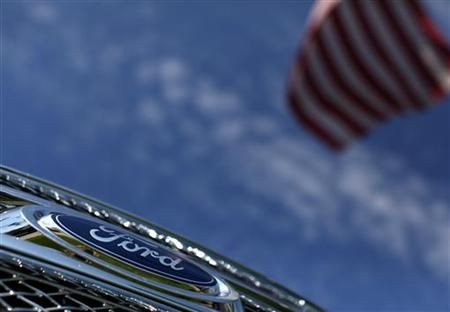Pace of UAW, Ford talks expected to quicken

The United Auto Workers expect the pace of talks with Ford Motor Co to quicken now that the sides are tackling economic issues and union President Bob King is at the table, a union official said on Monday.
The sides began high-level financial discussions for a new four-year labor deal that workers expect to be richer than one with General Motors Co.
I was joined today in my discussions with the company by President Bob King, and both he and I made it very clear to the company that now is the time to get down to business, UAW Vice President Jimmy settles, who is leading the talk at Ford, said in a memo. I expect the pace to quicken.
Settles added he was pleased with the status of the talks and most of the issues were focused on economic language. He previously said once a deal was close that meetings would last around the clock.
Teams of negotiators for the union and Ford, the only U.S. automaker to avoid bankruptcy, have been meeting for about two months. Financial issues typically are addressed in the final stages of negotiations.
The union began an intense focus on Ford a day after the UAW, failing to finalize a deal with Chrysler Group LLC, extended its contract with the Fiat SpA-controlled automaker until October 19.
Chrysler and UAW negotiators held high-level discussions over the weekend and will continue on Tuesday.
Meanwhile, UAW-represented workers have begun voting on a tentative four-year deal reached a week ago with GM. Union officials hope to wrap up that voting by Thursday.
As of Monday afternoon, at least 13 union locals had voted to ratify the deal, three had voted against it and 37 more had yet to vote, according to a union dissident group. UAW officials could not be reached to comment.
At the large GM Lordstown plant in Ohio, which begins voting on Tuesday, workers on Monday were writing Vote No on cardboard placards and leaving them in Chevrolet Cruze cars going down the assembly line, said Lordstown worker Nick Waun.
I have seen (GM) bosses going up and down the line pulling them out of the cars, said Waun of the worker-made signs.
The GM deal would keep or create more than 6,000 factory jobs, raise wages for entry-level workers, and guarantee all workers bonuses of at least $11,500 over four years.
The Detroit labor talks will set wages and benefits for about 112,500 unionized autoworkers and establish a benchmark for wages at auto parts suppliers and nonunion plants run by Asian and German automakers.
New four-year contracts for GM and Chrysler workers would be the first since those two companies were bailed out by the Obama administration in 2009. UAW-represented autoworkers have gone without a base pay increase since 2003.
The uncertain outlook for auto sales in 2012 and the risk of a renewed U.S. recession have made the Detroit automakers reluctant to offer traditional wage increases. Also, GM and Chrysler UAW workers gave up the right to strike for these contract negotiations as part of the government bailout.
Chrysler Chief Executive Sergio Marchionne and UAW President Bob King met on Friday and productive discussions are ongoing, the union and the automaker said. The union said those talks continue.
One issue Chrysler and the UAW could not agree on was the number of workers paid the entry-level wage of about $15 an hour, about half the traditional rate, said a source familiar with the talks who asked not to be identified. The automaker wants no limits on the number of such workers it can use, while the union wants a cap.
Chrysler has sought a cost-neutral contract, which would require wage increases for entry-level workers to be offset by higher worker healthcare contributions or in other areas.
Healthcare costs, then, would be one area in which a Chrysler agreement would differ from the tentative GM deal.
The talks with Ford, playing out at the company's Dearborn, Michigan, headquarters, also known as the Glass House, will be patterned roughly after the deal that covers 48,500 GM workers.
Ford's roughly 41,000 UAW-represented workers have the right to strike and have the highest expectations for wages and bonuses because of the automaker's performance. The UAW has not had a strike at Ford since 1976.
Although the UAW said there is no indication a strike against Ford will be necessary, Settles has said all local union presidents should begin preparing for one in case a deal cannot be reached.
(Reporting by Ben Klayman in Detroit; additional reporting by Bernie Woodall; editing by John Wallace, Andre Grenon and Bernard Orr)
© Copyright Thomson Reuters 2024. All rights reserved.




















